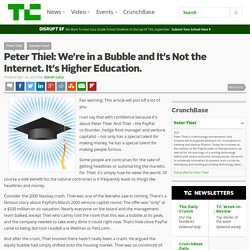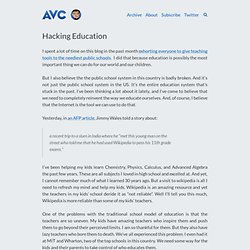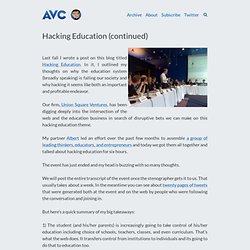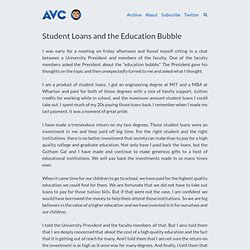

Media.enseignementsup-recherche.gouv.fr/file/2010/83/3/NIMESR1008_158833.pdf. How big is the education market in the US. What is the market for startups in the education space. How large is the online education market. Blog – The Price of Tutoring. Aaron is a cofounder of Tutorpsree, and a tutor. He’s the resident numbers dork (well, so is Paul), and writes about what we’ve learned and how it influences what we do The start of the new year means it’s time to take a look at overall trends in the tutoring universe. We’ve sliced up the profiles of 10,000 tutors to get a sense of pricing dynamics across the US. We’ve also pulled data out of nearly 80,000 subjects listed by tutors on Tutorspree as a way of understanding what it is that people want to teach.
The Price of Tutoring One of the more opaque pieces of the tutoring market is, of course what tutoring actually costs. Along with the average, the range of prices charged gives us information on market dynamics. What Teachers are Paid According to the National Bureau of Labor Statistics, the overall median hourly rate for educators is actually $21.97, which is less than 50% of the hourly wage listed on Tutorspree, and less than 8% of the max price in NYC (the highest priced market).
How big is the private tutoring industry in the United States. GSV-EDU-Factbook-Apr-13-2012. Peter Thiel: We’re in a Bubble and It’s Not the Internet. It’s Higher Education. Fair warning: This article will piss off a lot of you.

I can say that with confidence because it’s about Peter Thiel. And Thiel – the PayPal co-founder, hedge fund manager and venture capitalist – not only has a special talent for making money, he has a special talent for making people furious. Some people are contrarian for the sake of getting headlines or outsmarting the markets. For Thiel, it’s simply how he views the world. Of course a side benefit for the natural contrarian is it frequently leads to things like headlines and money. Consider the 2000 Nasdaq crash. And after the crash, Thiel insisted there hadn’t really been a crash: He argued the equity bubble had simply shifted onto the housing market. So Friday, as I sat with Thiel in his San Francisco home that he finally owns, I was curious what he thinks of the current Web frenzy. Is U.S. Higher Education A Bubble Economy? (Infographic Video) Plenty of smart people seem to think there’s a bubble in higher education.

And for good reason: The cost of a college education is skyrocketing and student debt is growing out of control, at the very same time that college graduates are struggling to find jobs. When they do, it’s often in positions that hardly require any of the "critical thinking" they were told a college education would teach them. Critics might count all this as mere alarmism--but the data backing up the trends is so freakin’ crazy. Just watch this video created by Education News. Hacking Education. I spent a lot of time on this blog in the past month exhorting everyone to give teaching tools to the neediest public schools.

I did that because education is possibly the most important thing we can do for our world and our children. Hacking Education (continued) Last fall I wrote a post on this blog titled Hacking Education.

In it, I outlined my thoughts on why the education system (broadly speaking) is failing our society and why hacking it seems like both an important and profitable endeavor. Our firm, Union Square Ventures, has been digging deeply into the intersection of the web and the education business in search of disruptive bets we can make on this hacking education theme. My partner Albert led an effort over the past few months to assemble a group of leading thinkers, educators, and entrepreneurs and today we got them all together and talked about hacking education for six hours. Student Loans and the Education Bubble. I was early for a meeting on friday afternoon and found myself sitting in a chat between a University President and members of the faculty.

One of the faculty members asked the President about the "education bubble. " The President gave his thoughts on the topic and then unexpectedly turned to me and asked what I thought. I am a product of student loans. I got an engineering degree at MIT and a MBA at Wharton and paid for both of those degrees with a mix of family support, tuition credits for working while in school, and the maximum amount student loans I could take out. I spent much of my 20s paying those loans back. I have made a tremendous return on my two degrees. When it came time for our children to go to school, we have paid for the highest quality education we could find for them. I told the University President and the faculty members all that.
So how you reconcile these two opposing views and what can we do about it? Technology can help. Repayment terms need to change as well.